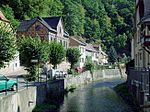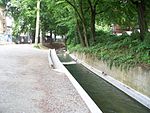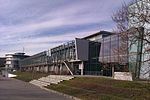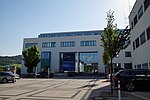Sparkassen-Arena, Jena
Basketball venues in GermanyBuildings and structures in JenaIndoor arenas in GermanySports venues in Thuringia

Sparkassen Arena is an indoor arena in Jena, Germany. It serves as the home arena for Science City Jena of the Basketball Bundesliga. It has a seating capacity of 3,000. The naming sponsor was a local savings bank, Sparkasse Jena-Saale-Holzland.In 2021, it hosted the PDC World Cup of Darts, which was won by Scotland.
Excerpt from the Wikipedia article Sparkassen-Arena, Jena (License: CC BY-SA 3.0, Authors, Images).Sparkassen-Arena, Jena
Keßlerstraße, Jena Burgau
Geographical coordinates (GPS) Address Website External links Nearby Places Show on map
Geographical coordinates (GPS)
| Latitude | Longitude |
|---|---|
| N 50.8999 ° | E 11.5886 ° |
Address
Sparkassen-Arena
Keßlerstraße 28
07745 Jena, Burgau
Thuringia, Germany
Open on Google Maps










